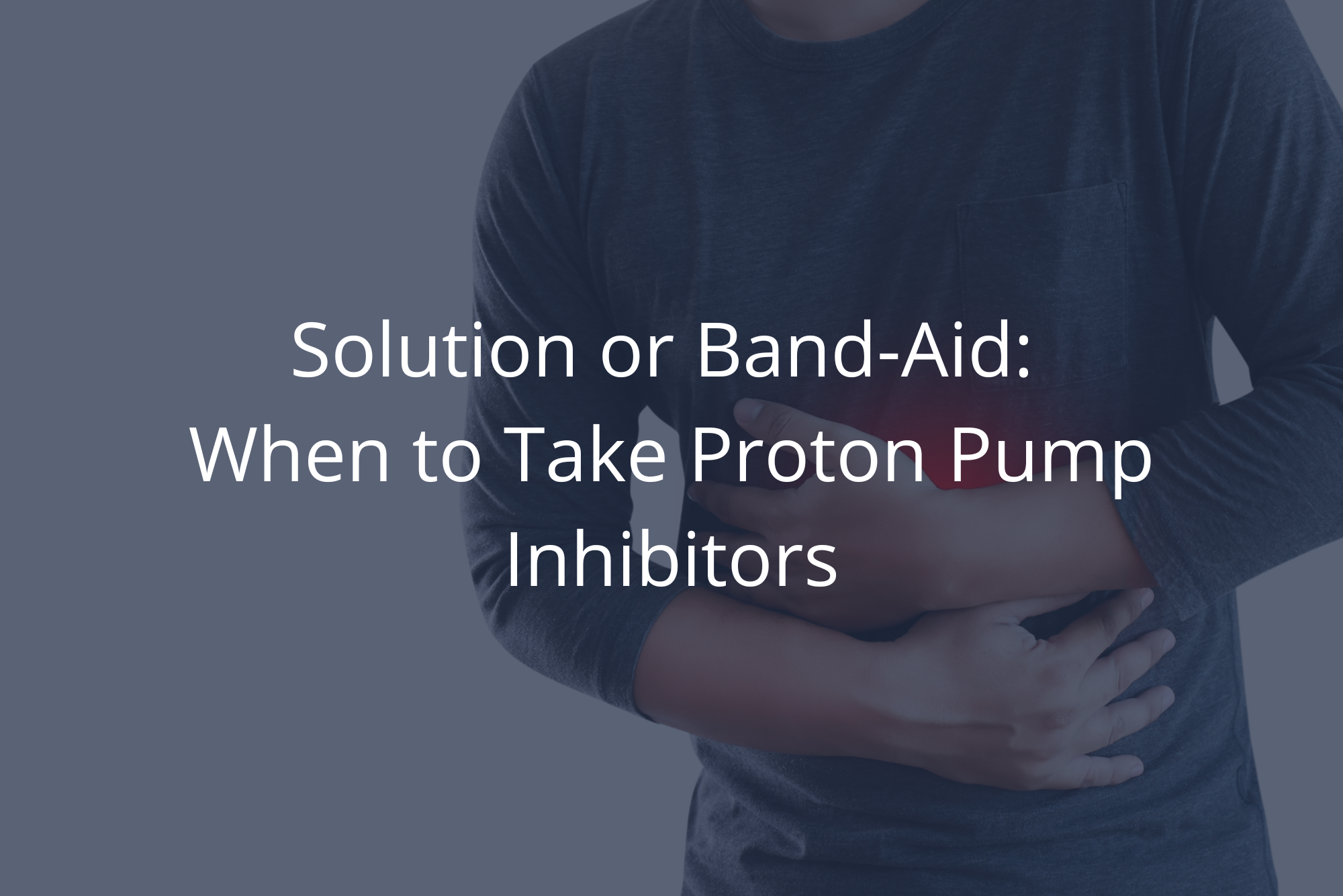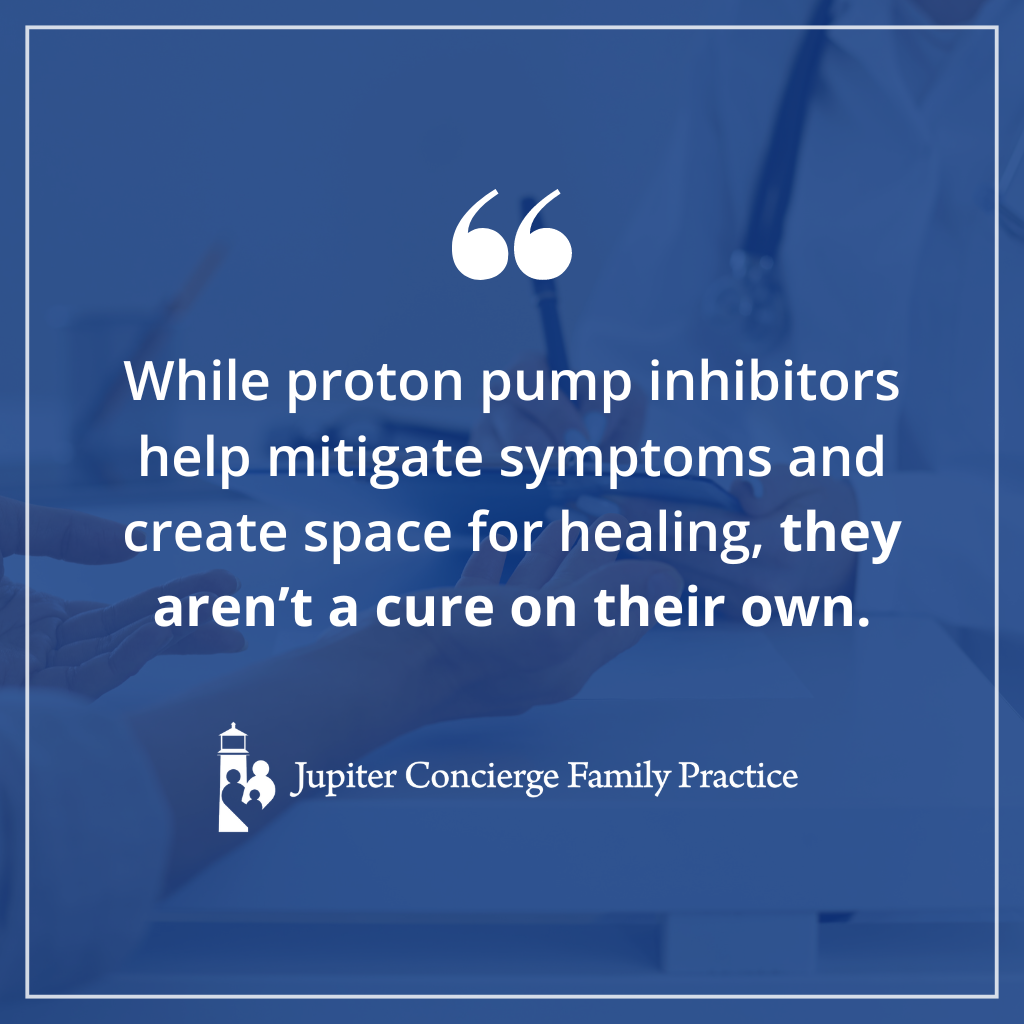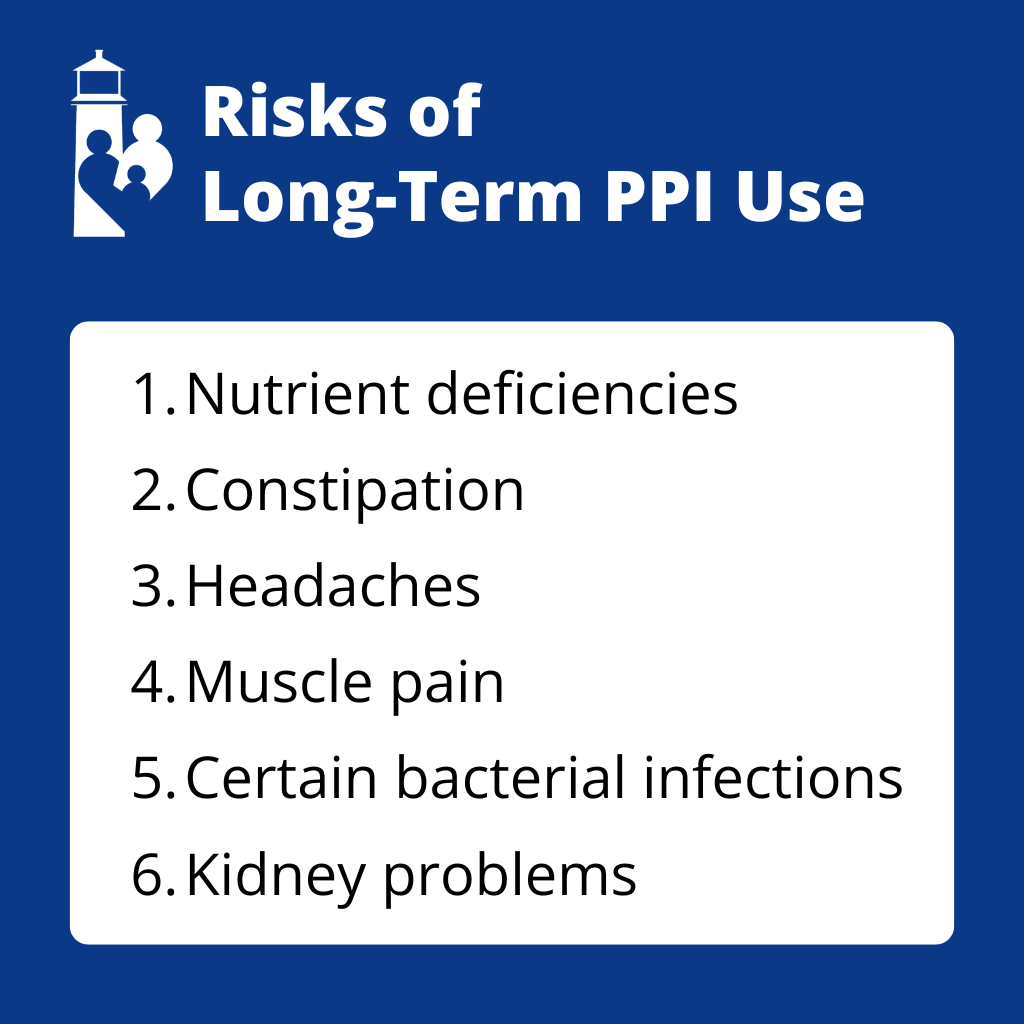
As a physician, I often see patients struggling with excess stomach acid and the discomfort it brings. Medication can provide much-needed relief, but it’s crucial to understand the limitations and potential risks.
In this blog post, we’ll discuss when to take proton pump inhibitors (PPIs), one of the most commonly prescribed acid-suppressing drugs on the market. We’ll look at what PPIs are, why we use them, and how they affect your health long-term.
What Are Proton Pump Inhibitors?
In simple terms, proton pump inhibitors are medications that decrease your stomach acid production. They’re commonly prescribed for conditions like:
- GERD (gastroesophageal reflux disease)
- H. pylori infections
- Gastric and duodenal ulcers
PPIs work by inhibiting the little mechanisms that produce acid in your stomach, called proton pumps. This provides symptom relief and allows any damaged tissue to heal. When used alongside antibiotics for H. pylori treatment, proton pump inhibitors can even enhance the treatment’s effectiveness.
Why PPIs Aren’t a Permanent Fix
While proton pump inhibitors are undeniably useful in managing acid-related issues, they aren’t designed to permanently alter your body’s acid production. In other words, if you take a PPI to relieve the symptoms of excess acid but change nothing else, the original issue will come right back when you stop taking the medication.
So, while proton pump inhibitors help mitigate symptoms and create space for healing, they aren’t a cure on their own.
Unfortunately, many people fall into a problematic pattern when they decide to take a proton pump inhibitor.
As they start a PPI regimen, people often make concurrent positive lifestyle changes — an excellent move. They start to feel better, which confers the idea that they’re “cured.” Relinquishing the caution brought on by their symptoms, they gradually reinstate old diet and lifestyle habits as they continue the medication.
Since such a course doesn’t address the root cause of acid issues, many patients struggle to successfully get off their medications. This can lead to long-term PPI use, which comes with its own set of risks.
The Risks of Long-Term PPI Use
With nearly a quarter of all adults worldwide using proton pump inhibitors, we’d be wise to consider the potential effects of taking a short-term drug for too long.
One major downside of extended proton pump inhibitor use is the medication’s interference with nutrient absorption and processing, particularly vitamin B12, magnesium, and calcium. While the mechanisms of interference aren’t always understood, the resultant deficiencies can contribute to serious health issues, such as increased risk of osteoporosis and fractures.
Other potential side effects of prolonged PPI use include:
- Constipation
- Headaches
- Muscle pain
- Certain bacterial infections
- Kidney problems
Remember that medications like PPIs are processed by the kidneys, so chronic use can strain these vital organs.
When to Take Proton Pump Inhibitors
Despite the risks, proton pump inhibitors are warranted and beneficial in certain circumstances. If you’re struggling with severe acid reflux, experiencing frequent heartburn, or have a confirmed ulcer, PPIs can provide essential relief and facilitate healing.
The key here is to use PPIs in conjunction with lifestyle modifications to address root causes, and always under the guidance of your physician.
As doctors, we weigh the risks of each medication versus the benefits it provides. With acute symptoms, proton pump inhibitor benefits often outweigh the risks. As symptoms improve, the risk-benefit ratio changes. At this point, we reassess and consider tapering off the medication.
When the Solution Becomes a Problem
Too often, proton pump inhibitors are seen not as a temporary means of healing but as a blank check to continue an unhealthy lifestyle. Without understanding the risks or the true purpose of PPIs, patients often continue consuming foods or beverages that trigger their acid production, relying on the medication to avoid the immediate consequences.
While taking a PPI may provide short-term relief, you can’t have a pizza and a beer for dinner each night without long-term consequences.
Suppressing your body’s natural response to harmful substances doesn’t negate their impact on your health. In fact, it can lead to more severe issues down the line.
The Path to Balanced Acid Production
Our bodies naturally maintain a delicate balance in stomach acid production. More often than not, it’s our own habits and choices that disrupt this equilibrium.
The most effective way to manage acid problems is through lifestyle modifications, particularly in our diet. Any way we slice them, certain foods and drinks just aren’t good for us regardless of the amount — like alcohol. If you can’t avoid such items entirely, then moderation is key to ensuring you don’t disrupt your gut.
The following are some common diet-related lifestyle modifications for reducing acid issues:
- Avoid trigger foods and beverages
- Practice moderation with alcohol
- Eat smaller, more frequent meals
- Don’t lie down right after eating
- Maintain a healthy weight
By addressing the root causes of acid overproduction, you can often reduce or eliminate the need for proton pump inhibitors.
Note: If you and your doctor decide it’s time to end your PPI treatment, remember to prepare for the rebound effect. People who take proton pump inhibitors for more than four weeks often experience an increase in acid production after stopping the medication, which can last from a few days up to several weeks.
Again, this is why it’s important to work with your doctor to find alternative means of controlling acid production during this rebound window, or you’ll likely have difficulty ditching the drug.
When to Take Proton Pump Inhibitors: Final Thoughts
Proton pump inhibitors can be a valuable tool in managing acid-related conditions, but they should be used thoughtfully and under medical supervision. While they provide relief and the opportunity for healing, they aren’t a long-term solution.
If you’re experiencing acid issues, discuss with your doctor when to take proton pump inhibitors and when to try lifestyle modifications. And if you’re attempting to get off a PPI, work closely with your physician to make choices that will lead to lasting success.

Dr. David Rosenberg
Dr. Rosenberg is a board-certified Family Physician who obtained a BS in Chemistry at Georgia's Mercer University in 1983 and a medical degree from the University of Miami in 1988. He completed his residency in Family Medicine at The Washington Hospital in Washington, Pennsylvania, in 1991 and then practiced Emergency Medicine at Palm Beach Gardens Medical Center for two years. In 1993 he started private practice in Jupiter.
Dr. Rosenberg has been married to his wife Mary for 38 years and they have three grown children together. Some of his interests include being a huge baseball fan, sailing, snow skiing, self-development, and learning to play piano.


